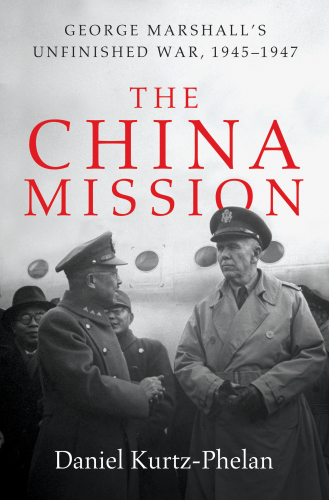
The China Mission
George Marshall's Unfinished War, 1945-1947
کتاب های مرتبط
- اطلاعات
- نقد و بررسی
- دیدگاه کاربران
نقد و بررسی

February 1, 2018
A comprehensive history of one of the United States government's greatest diplomatic failures, presided over by one of the country's greatest diplomats.In December 1945, with China dissolving into civil war between Mao Zedong's Communists and Chiang Kai-shek's Nationalists, President Harry Truman sent retired Army Chief of Staff George C. Marshall (1880-1959) to fix matters. Unfortunately, his efforts failed miserably, and "many Americans would give Marshall and his mission a bitter share of the blame" for "losing" China, writes journalist Kurtz-Phelan, executive editor of Foreign Affairs, in this astute and surprisingly entertaining account. Everyone believed that if anyone could succeed, it was Marshall, who had overseen the largest military expansion in U.S. history, emerging from World War II as perhaps America's most admired public figure. Most experts knew that Chiang's government was a mess, but no one wanted American troops to become involved. Furthermore, "regime change" did not become the preferred policy for another 60 years, so the administration hoped to persuade Chiang to reform and the Communists to join a coalition government. To universal amazement, within weeks of arriving, Marshall achieved a cease-fire, followed by Chiang agreeing to end one-party rule and the Communists agreeing to dissolve their army and integrate troops into a national military force. Then progress stopped. Chiang and his party refused to share power. At first, Stalin supported Marshall because he believed the Communists would lose a civil war. As East-West hostility grew throughout 1946, he changed his mind. Although Marshall remained for another frustrating year, on his departure in January 1947, civil war was underway. A superb researcher, Kurtz-Phelan ably narrates an exasperating story featuring a genuinely peerless hero doing his best in a no-win situation.The definitive history of a failure from which the U.S. seemingly learned nothing (civil war in Vietnam was already heating up).
COPYRIGHT(2018) Kirkus Reviews, ALL RIGHTS RESERVED.

March 15, 2018
Immediately following World War II, President Harry Truman charged former army chief of staff George C. Marshall with the impossible task of unifying China under Nationalist leader Chiang Kai-shek, with a supporting role to be played by Mao Zedong's Communist party. Kurtz-Phelan (executive editor, Foreign Affairs) vividly reveals the events of this hopeless endeavor, even when led by Marshall, the architect of the Ally's victory. Neither Chiang nor Zhou Enlai, Mao's diplomatic representative, would bargain in good faith, reneging on promises depending on which party held the upper hand at any given time. This deeply researched, gripping account is enhanced by the author's striking portrayals of these complex leaders. Marshall's belief that his chances were bleak were based on his observation of Chiang as "the worst advised military commander in history." In 1949, Chiang fled to Taiwan, leaving China to Mao and his Soviet-backed Communist Party. Although Truman and Marshall were vilified by U.S. anticommunist hardliners for losing China, history has redeemed both men, with Marshall going on to win the Nobel Peace Prize. VERDICT This page-turning narrative of an important chapter in Cold War history will find an appreciate audience among history buffs and scholars.--Karl Helicher, formerly with Upper Merion Twp. Lib., King of Prussia, PA
Copyright 2018 Library Journal, LLC Used with permission.

























دیدگاه کاربران